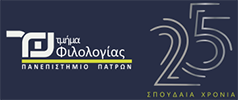From 2018-2019 the Department of Greek Philology will offer two new Postgraduate Programmes:
Applications to the Postgraduate Programmes will be accepted after the relevant call has been officially announced.
Entry Requirements
Classics
- An average undergraduate degree score of 6.5 (very good) or above.
- Knowledge of at least one of the following languages at B2 level: English, French, German, Italian.
Modern Greek Studies
- An average undergraduate degree score of 6.5 (very good) or above.
- Knowledge of at least one of the following languages at B2 level: English, French, German, Italian.
Linguistics
- An average undergraduate degree score of seven (7) or above
- An average score of 7.5 in specialisation courses
- Specialisation courses are defined as those belonging to the areas of General, Theoretical and Applied Linguistics.
Byzantine Studies
- An average undergraduate degree score of 6.5 (very good) or above.
- Knowledge of at least one of the following languages at B2 level: English, French, German, Italian.
Adequate knowledge of a foreign language is certified by means of submitted documentation. Documentation entails certificates from any recognised Greek or foreign institution. Candidates who cannot provide such documentation are asked to take a written test.
Selection criteria in percentages
The list of successful candidates is drawn with the following +++
N.B.: The average score of undergraduate specialisation courses are calculated in the following manner:
ASSC * NSC / HNSC
ASSC= Average Score in Specialisation Courses
NCS= Number of Specialisation Courses
HNSC= Highest Number of Specialisation Courses (defined at each instant by the candidate with the highest number of specialisation courses)
Classics
Score in Specialisation Courses: 20%
- Specialisation Courses are those pertaining to Ancient Greek and Latin Texts, Ancient Greek and Roman History and Ancient Greek and Roman Civilisation up until Late Antiquity.
Interview: 50%
- In addition to testing the candidate’s knowledge of history of classical literature, as defined in the Examimation Materials (see below), comprehension in ancient Greek and Latin may be tested at the interview.
Foreign languages: 15% [English B2 and above: 5%, second/third/fourth foreign language 10%]
Average degree score: 10%
Writing/research activity: 5%
- Writing and research activity includes a successful undergraduate dissertation or other undergraduate essays, general research activity, participation in research programmes, participation in Summer Schools, publications, participation in the Erasmus Programme etc.
Entry threshold: 60%
Modern Greek Studies
Written examination: 30%
Score in specialisation courses: 20%
- Specialisation courses are those pertaining to Modern Greek and European Literary Studies, Modern Greek and European Civilisation, Theory of Literature and Comparative Literature.
Interview: 20%
Foreign Languages: 15% [English B2 and above: 5%, second/third/fourth language 10%]
Average degree score: 10%
Writing/research activity: 5%
- Writing and research activity includes a successful undergraduate dissertation or other undergraduate essays, general research activity, participation in research programmes, participation in Summer Schools, publications, participation in the Erasmus Programme etc.
Entry threshold: 60%
Linguistics
- Interview: 35%
- Score in undergraduate specialisation courses
- Minimum average score in undergraduate specialisation courses: 7.5/10
- Specialisation courses are those pertaining to General, Theoretical and Applied Linguistics
- Foreign languages: 15% [English B2 and above 10%, second/third/fourth language: 5%]
- Average degree score: 7%
- Minimum general score 6.5/10
- Successful undergraduate dissertation – other essays: 8%
- Research activity: 5%
- Research activity may include independent research, and other qualifications, such as participation in research programmes, attending Summer Schoold, participation in the Erasmus Programme etc.
Entry threshold: 60%
Byzantine Studies
Written examination: 30%
Average score in undergraduate specialisation courses: 20%
- Specialisation courses are those pertaining to Byzantine and Medieval Literary Studies and Byzantine Civilisation.
Interview: 20%
Foreign languages: 15% [English B2 and above 15%, second/third/fourth language: 10%]
Average degree score: 10%
Writing/research activity: 5%
- Writing and research activity includes a successful undergraduate dissertation or other undergraduate essays, general research activity, participation in research programmes, participation in Summer Schools, publications, participation in the Erasmus Programme etc.
Entry threshold: 60%
The above selection criteria do not apply to Greek or foreign I.K.Y. scholarshiip holders, who are individually assessed on the basis of the terms and conditions of their scholarship. The Postgraduate Programme accepts one additional candidate from the National Scholarship Institution (I.K.Y.) who succeeded in the postgraduate competition in a subject area relevant to the Postgraduate Programme and one foreign scholarship owner from IKY. With the decision of GSES the number of the scholarship owner may rise. Foreign SOCRATES/ERASMUS students may occasionally participate in the Programme.
If the specialisation believes that a successful candidate needs support in core subjects, it may request obligatory attention of required undergraduate courses, with the agreement and license of the Postgraduate Studies Committee.
Fees
Fees for attending the Postgraduate Programme ‘Modern Approaches to Texts: Readings and Interpretations’ are stipulated to 1.500 euros and will be divided into four instalments, three instalments of 400 euros each and one instalment of 300. The first instalment must be paid upon enrolment to the Programme. The remaining three must be paid within 20 days from the beginning of each term.
The Postgraduate Programme Linguistics: Language and Communication does not require fees.
